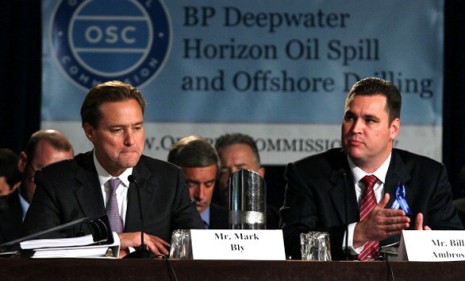Has Big Oil learned its lesson from the Gulf spill?
BP wants to resume drilling in the Gulf. Meanwhile, the operators of the Deepwater Horizon rig give its executives bonuses for the "best year for safety ever." Huh?

A free daily email with the biggest news stories of the day – and the best features from TheWeek.com
You are now subscribed
Your newsletter sign-up was successful
It's less than a year since the April 20, 2010 explosion in the Gulf of Mexico caused the largest offshore oil spill in U.S. history, but BP is reportedly already trying to start drilling there again. The oil giant, one of the leading producers in the Gulf before the accident, is said to be talking with U.S. regulators about resuming work as early as July — a report that energy secretary Ken Salazar has denied. It also emerged over the weekend that Transocean, the operators of the Deepwater Horizon rig, awarded its executives $2.8 million in bonuses for overseeing "the best year for safety ever" — though eleven workers were killed in the incident. Has Big Oil learned anything from the devastating accident of 2010?
BP's return was inevitable, but still unwanted: Renewed BP drilling in the Gulf, under "stricter safety regulations," was always "going to happen at some point," says Rosie Gray at The Village Voice. We couldn't reasonably expect BP to "dissolve the company and never drill for oil again," especially as Obama came out "in support of increasing domestic oil production" last week. That said, we didn't expect this move already. "Allowing BP to get back to business so soon is not a good look."
"BP wants to get back to drilling in Gulf of Mexico"
The Week
Escape your echo chamber. Get the facts behind the news, plus analysis from multiple perspectives.

Sign up for The Week's Free Newsletters
From our morning news briefing to a weekly Good News Newsletter, get the best of The Week delivered directly to your inbox.
From our morning news briefing to a weekly Good News Newsletter, get the best of The Week delivered directly to your inbox.
Transocean's bonuses were unacceptable: Despite 11 dead workers and the fact that millions of barrels of oil are still polluting the Gulf of Mexico, this company boasted, with a straight face, that it achieved an "exemplary statistical safety record," says Meteor Blades at the Daily Kos. "Once upon a time, such a statement would at least have brought red to the cheeks even of oil executives. Now, it merely adds green to their bank accounts."
"Eleven dead no obstacle to Transocean's annual 'safety' bonuses"
Put down your pitchforks. This isn't what it seems: Environmentalists got their "outrage fix" from the weekend's news, says Michael Lemonick at TIME, but it wasn't quite as bad as it appeared. The idea that BP will return to the Gulf this summer looks like "pure fiction." And, though it was insensitive for Transocean to make its announcement, the company did have its best safety year ever. People are killed on oil rigs all the time. "It just doesn't make the news." Statistically, it was possible for 11 workers to die "and still leave the company less scathed than in any other year."
"BP set to drill again in the Gulf! Or ... wait ..."
A free daily email with the biggest news stories of the day – and the best features from TheWeek.com